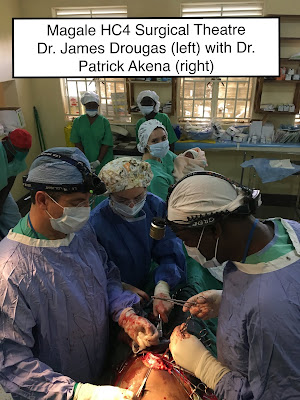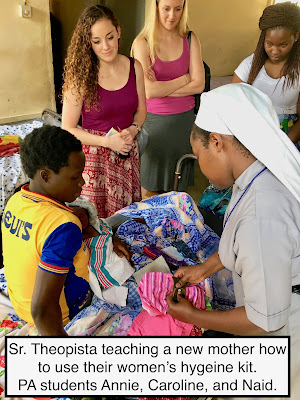Global Health Educators
Program Report from Uganda Trip
May 2018
Travelers: Judy Gustafson MD, MPH, James Drougas MD, Wilton Kennedy, DHSc., PA-C, with Five Physician Assistant students from Jefferson College of Health Sciences: Annie Hamner, Syndey Garst, Jamie Knapp, Caroline Schieber, and Naid Allassain
Our Vision:
Improve women and newborn health in the developing world.
Mission:
Improve the health of communities through educational teaching programs and sustainable interventions.
Goals:
• Improve maternal and newborn health.
• Strengthen medical care at the level of the health center.
• Improve community health through educational and sustainable interventions.
The following is a brief report on events, programs, and some of the projects addressed during our most recent visit.
Magale Health Center Level 4 - Health System Strengthening
Surgical and Anesthesia Mentoring:
All surgical procedures were done in collaboration with the Ugandan medical staff. Multiple surgeries were performed with emergency c-sections, wounds, and hernia repairs being the most common surgical cases. Most cases were done with spinal anesthesia to reduce anesthetic risks and improve mother and newborn outcomes. Dr. Patrick Akena became especially adept at spinal anesthesia placement with the numbers of cesarean sections needed at Magale HC4.
Surgical safety checklist:
The challenge: To improve patient safety in the operating room with a checklist for a population where English is the second language. The project: The World Health Organization’s recommended checklist for surgery was modified by adding visual images in addition to the written words. This checklist was presented during an organized training program and the laminated page mounted on the wall in the operating theatre.
Maternal/Newborn Checklist:
The World Health Organization checklist for safe births was presented at a conference at Magale HC 4 with midwives representing Magale HC and 12 surrounding health centers that refer their complicated patients to Magale HC. The 5 traveling PA students all presented at the meeting. The World Health Organization’s checklist was adapted to the local culture by adding visual images as reminders. Each of the 15 Health Centers received a laminated copy of the visually adapted checklist that are to be mounted in the maternity wards.
Maternal Health extended to 2 additional health centers for a total of 15 Health Centers included in the Community Health Program
Time was taken to travel to these additional clinics to welcome them with the delivery of blood bressure machines, rubber boots, women’s hygeine kits, and maternal/newborn safety checklists.
Women’s Hygiene Kits: The challenge: Many mothers come to deliver at Magale HC4 with limited supplies for personal hygeine following the birth of their children. The Project: Each mother birthing at Magale HC4 were given women’s hygeine kits through a donation by the U.S. organization “Days For Girls.” Each kit contains instructions on using the washable sanitary napkin pads, holders with snaps, underwear, a washcloth, and a bar of soap.
A Rough Way to Come Into the World
There are many reasons why a newborn baby born in Magale HC4 in Uganda, Africa has significantly less of a chance for survival than a baby born here in Roanoke, Virginia. Access to a medical center is very difficult for multiple personal and financial reasons. Especially during the rainy season, transportation on muddy, unpaved roads is nearly impossible. Modern fetal monitoring that can detect fetal distress is not available at any of these health centers we work with in rural Eastern Uganda. Because of all of these challenges, it is likely that many newborns will require resuscitation at birth in order to survive. The donated Ambu bags are absolutely critical to the success of the newborn resuscitation training program conducted by Global Health Educators.
A big thanks to Sara Wohlford and her team at Carilion for taking the time to collect these bags for us to take to Uganda. Special thanks to Susan Hill, CRNA in taking the lead on this project and taking time to help train our student travelers on the technique of newborn resuscitation.
Newborn Warming
This program was initiated in 2015 when it was noted that low birth weight infants had a much higher mortality rate if their core temperatures dropped with the cool nights, lack of incubators, and mothers with limited supplies delivering at Magale HC4. Each morning the team helped to delivery supplies to the mothers and their newborns, thanks to the generous donation of baby hats and blankets from friends and families in the U.S.
Community Health Program
Bubulo East Traditional Birth Referral Agents BETBRA
Rural Eastern Uganda is challenged with difficult terrain making access to health centers nearly impossible at times, especially during the rainy season. Community members referred to as “Traditional Birth Attendants” have been assisting more than 50% of mothers deliver their babies outside of a formal health center. Global Health Educators has been working with community health leaders and midwives to improve maternal and infant health by forming an organization of Traditional Birth attendants to refer the patients to one of the 13 local health centers for delivery and also recognize the warning signs of diseases of pregnancy such as eclampsia.
Transportation is predominantly on foot, especially during the rainy season. Rubber Boots, locally known as “Gum Boots,” are of extreme value to help get the patients to the health centers. One hundred pairs of rainboots were purchased with prior funding in 2017, but with the help of generous U.S donations made to Global Health Educators in 2018, 300 more rain boots were purchased in Uganda with most of the boots distributed to the active Bubulo East Referrral Agents who attended the training program at Magale Health Center. The rest of the boots were delivered over the following 3 days to those active members where were unable to attend the program.
Albinism Awareness: The leadership of the TBRAs also organized the “Albinism Awareness Program,” that had been initiated in October 2015 with the help of Jefferson College of Health Sciences in Roanoke. There are an estimated 192 Ugandans with albinism located in the areas surrounding Magale Health Center 4. The group from GHE delivered hats and sunglasses that will be distributed by members of the Community Health Organization.
Vision Project: This project was initiated in October 2015 with the PA students from Jefferson College. Again, donated reading glassed were taken to Uganda and delivered to the Community Health Leaders of BETBRA program to distribute to Ugandans needing reading glasses. Sincere thanks to all of our friends and family who donated glasses for this program.
Just For Fun
St. Angela’s Boarding School
Dr. Wilton Kennedy and PA students deliver 12 donated soccer balls to St. Angela’s Boarding School.
Water Sports on the Nile River
On the way back to the airport, the group had a stopover in Jinja for a well deserved rest before taking the long flight back to the United States. Jinja is in a beautiful location situated on Lake Victoria, the source of the Nile River.
Final Thoughts
This was my 11th trip to Uganda since 2013. The sisters at Magle Convent provided us with safe food and lodging with close proximity to Magale Health Center. As always, the sisters also provide all of our travelers the ability to learn the culture first hand with their kind hearts and generous spirits. The nuns living and working at the convents, schools, and associated health clinics devote their lives to caring for their community and visitors regardless of religious beliefs or affiliations. Their ability to laugh, sing, and dance despite their challenging conditions is always an inspiration.
My sincerest gratitude to all those who make GHE possible at both my homes in the United States and Magale Trading Center, Uganda, Africa. A very special thanks to the medical staff at Magale Health Center 4 and Dr. Patrick Akena in particular who worked with us in May 2017. Patrick took his only free time off from his clinical training in Mbale Regional hospital in order to spend time with us during our visit one year later! His devotion to the practice of medicine is truly inspirational.
We hope to see you again soon!
:) Judy
Director Global Health Educators



































































